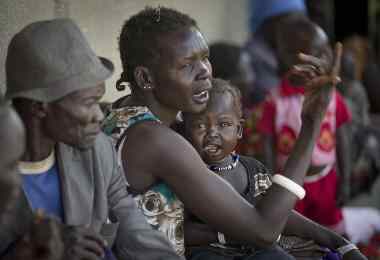South Sudan war victims’ family members demand accountability
June 9, 2016 (JUBA) – Human and civil rights activists acting in solidarity with family members of victims of the civil war in South Sudan have expressed disappointments at president Salva Kiir for soliciting international support for reconciliation at the expense of justice.

But First Vice President, Riek Machar’s press secretary, James Gatdet Dak, distanced their office from the document, saying Machar was not part of the alleged proposal to drop justice for war crimes.
The proposal from President Kiir’s office attracted criticisms from the war-ravaged nation who demanded accountability for the war crimes.
Wol Deng Wol Monychol, a native of Western Bahr el Ghazal state, said he was shocked to learn the leaders have decided to shelf hybrid court at which perpetrators would be tried for their role in the 21 months of conflict during which heinous atrocities were committed by the parties to the conflict at the height of the war.
“There are some indications, and it’s really not just speculations but a clear indication that perpetrators will not accept the establishment of the court and hand themselves for trials, but this does not mean South Sudan belongs to them and this does not mean they are above the law to escape or defer accountability. Those who have issues to answer must be held to account,” said Monychol.
Gatwech Tut Joak, a native of Akobo but now living at the United Nations camp in Juba said he was outraged upon learning that the two leaders have allegedly asked for the court to be established because those who may have played a role in the conflict may reject and choose to go to the bush instead of handing themselves over to the court to be tried.
He said he was outraged after confirmation by President Kiir’s press secretary that his boss indeed asked for dropping of justice and accountability for the criminals who committed the crimes during the war.
“I was shocked and outraged by what I read and confirmed by presidential spokesperson Ateny Wek Ateny. I thought it was just a media report when I saw it. But if this is now true as Ateny Wek said it, then what messages does this convey to the victims of war? So they must kill and walk away without being held accountability. What precedent will this set,” asked a visibly angered Joak on Thursday.
Joak said the trials of the perpetrators will restore hope and build confidence. He asked who would be held accountable for the killings of innocent people if there are not going to be trials for atrocities committed during the war and what precedent it will set if people commit crimes not and punished.
Sebit Anthony, a South Sudanese based in Nairobi, Kenya, said he was not surprised the leaders were now pushing for indefinite deferral of the establishment of a hybrid court because of the role they themselves have played in the conflict.
“Obviously, nobody should be surprised about this article. There is nowhere a perpetrator would accept to investigate himself or herself and go to the court for a crime the person has committed. I am aware that even if the court is established, they will not allow the Hybrid court to carry out its mandate. But what I know is that they will have to face the court one day, even if after they are gone from power,” said Anthony.
The activist said the only alternative for the people is to unite and vote them out of power in order to allow a new president to make the perpetrators pay for the crimes they committed during war.
The outcry comes after a New York Times published an article purporting to have been written by President Salva Kiir and the first vice president Riek Machar, as co-authors, asking the international community to help them work for reconciliation instead of pursuing the formation of hybrid court.
The two leaders, according to the report, alleged in an opinion article that time for the court was not right to establish it for trials.
However, the office of Machar said the article was prepared by someone without his knowledge.
His spokesperson, Dak, said Machar is committed to the implementation of justice and accountability mechanism to pursue the trial of perpetrators of crimes as well as pursue reconciliation and healing concurrently without compromising the importance of each of the two processes.
Tens of thousands of people have been killed, beginning with the massacre of thousands of civilian members of the ethnic Nuer community in Juba. The war then spread to other states, leading to more crimes committed by the parties to the conflict.
(ST)
